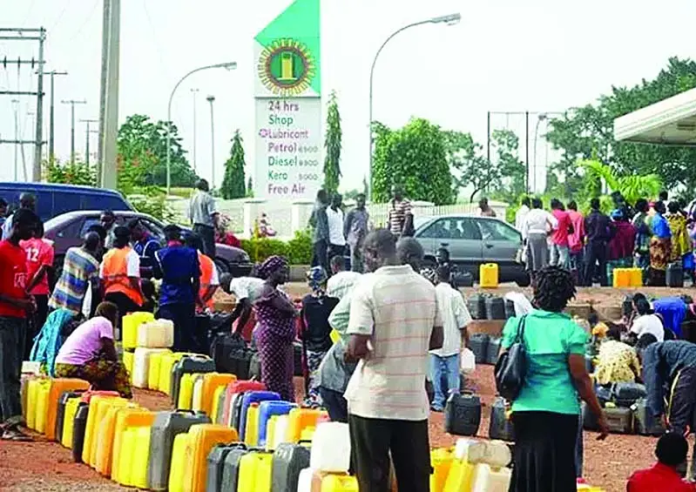FOR nearly a month across the country, long queues and the sight of hapless people hovering around filling stations with empty jerry cans continue to constitute a national embarrassment.
This is due to yet another scarcity of the product which the NNPC admitted too late, making the problem to exacerbate while the company and the federal government lived in self-denial. It is now clear that the fuel subsidy removal was a time bomb as experts had warned that a deregulated petroleum market that relies on importation is a recipe for chaos. The market is bound to experience hiccups in response to vagaries in the international prices of crude and the level of crude production at home.
So even if the relevant authorities had foreseen the crisis, there was little they could do to avert it, little wonder the NNPCL made excuses that hardly made any sense. NNPCL gave excuses that included floods, public holidays and finally, non-existent glitches.After days of hardship, NNPCL admitted they weredue to logistics problems which had been resolved.
So what started like a hitch in distribution in the Lagos axis snowballed into a crisis which is almost grounding the country to a halt.In any case, NNPCL must understand that the truth is necessary in the face of such a crisis. It should not be about saving face or acting like there is no problem.
Sadly, the crisis is happening at the height of poor electricity supply and general economic hardship. And it is fast spreading to more states across the country. It is now clear even to the so-called optimists at the NNPCL that it has nearly run out of stock. Worse than that, the product is not available in the country. We gathered that it has become a bit of a challenge to source the product because most refineries in Europe are undergoing turnaround maintenance.
Also to blame for the acute shortage in supply are importation bottlenecks and the slow pace of marketers’ license renewal by the Nigerian Midstream and Downstream Petroleum Regulatory Authority (NMDPRA). We are concerned that only 1,050 marketers out of 15,000 have had their licenses renewed by NMDPRA.
Once there is a lack of supply or inadequate supply, what you will see is scarcity and queues will emerge at filling stations, besides the NNPCL is quick to attribute it to logistics and vessel problems but fails to understand that once there is a breach in the international supply chain, it will have an impact on domestic supply because we depend on imports. Beyond logistical issues, NNPCL must admit that being a sole importer of petrol in the country, sourcing petroleum products has become a bit difficult.
It is now clear that the people cannot take its repeated assurances to the bank because no one knows when they will be an improvement in the supply chain or when vessels may be arriving as usual. Once that is done, normalcy will return. This is because once the 30-day supply sufficiency is disrupted, it takes two to three months to restore it.
Based on the importance of petrol to citizens, there should be no room for such disruptions. There is need for better collaboration between NNPCL and IPMAN, just as there should be transparency in the entire system. In any case, we expect nothing short of a restoration of supply so that within another week, normalcy should return.


